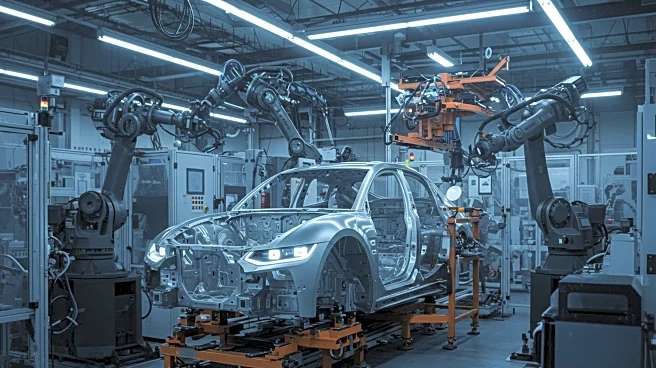What's Happening?
Leapmotor, a Chinese automotive brand, is set to begin Completely Knocked Down (CKD) production in Malaysia, as announced by Stellantis ASEAN managing director Isaac Yeo. The Gurun plant is being prepared to produce semi-knocked down (SKD) models, starting with the Leapmotor C10 electric SUV by the end of the year. This move involves an initial investment of €5 million (RM24.5 million) in the facility, which has a capacity of 60,000 units. The decision is driven by the end of the CBU EV subsidy, which will lead to higher prices for imported electric vehicles. CKD models, benefiting from tax exemptions extended until 2027, will have a competitive edge in pricing. The production is aimed not only at the Malaysian market but also for export, with plans to utilize the Gurun plant's capacity for exporting models beyond ASEAN countries.
Why It's Important?
The initiation of CKD production by Leapmotor in Malaysia is significant for several reasons. It positions Leapmotor to capitalize on the growing demand for electric vehicles in Malaysia, a market that is currently open to automakers. The CKD tax exemptions provide a pricing advantage, allowing Leapmotor to compete more effectively against imported models. This move also supports Malaysia's ambition to become a manufacturing hub for EVs in the Asia Pacific region, potentially boosting local employment and economic activity. Furthermore, the export plans could enhance Malaysia's role in the global automotive supply chain, contributing to the country's economic growth and technological advancement.
What's Next?
As Leapmotor begins CKD production, the next steps involve deeper localization and full CKD assembly for smaller models like the B10. The company aims to achieve a yearly target of 2,400 units per model, a significant increase given its current market position. Stellantis plans to expand the export of these models beyond ASEAN countries, leveraging the Gurun plant's capacity. This expansion could lead to increased investment in Malaysia's EV infrastructure and further development of the local EV ecosystem. Stakeholders, including government agencies and industry players, may respond by enhancing support for EV production and export initiatives.
Beyond the Headlines
The decision to produce CKD models in Malaysia highlights broader trends in the automotive industry, such as the shift towards localization and sustainable manufacturing practices. It underscores the importance of strategic investments in regions with favorable regulatory environments and tax incentives. This development may also prompt other automakers to consider similar strategies, potentially leading to increased competition and innovation in the EV market. Additionally, the focus on exports aligns with global efforts to reduce carbon emissions by promoting electric vehicles, contributing to environmental sustainability.









